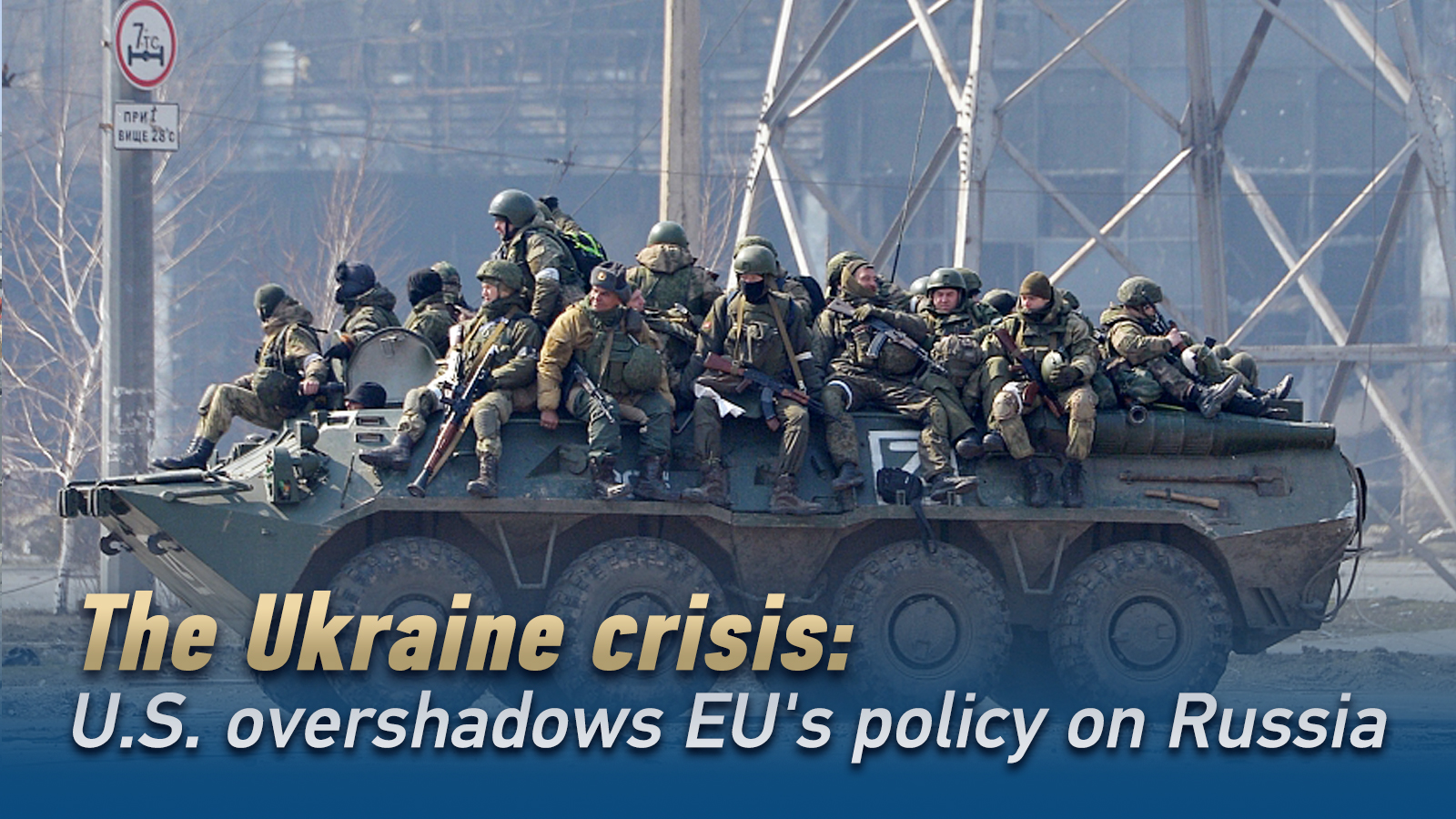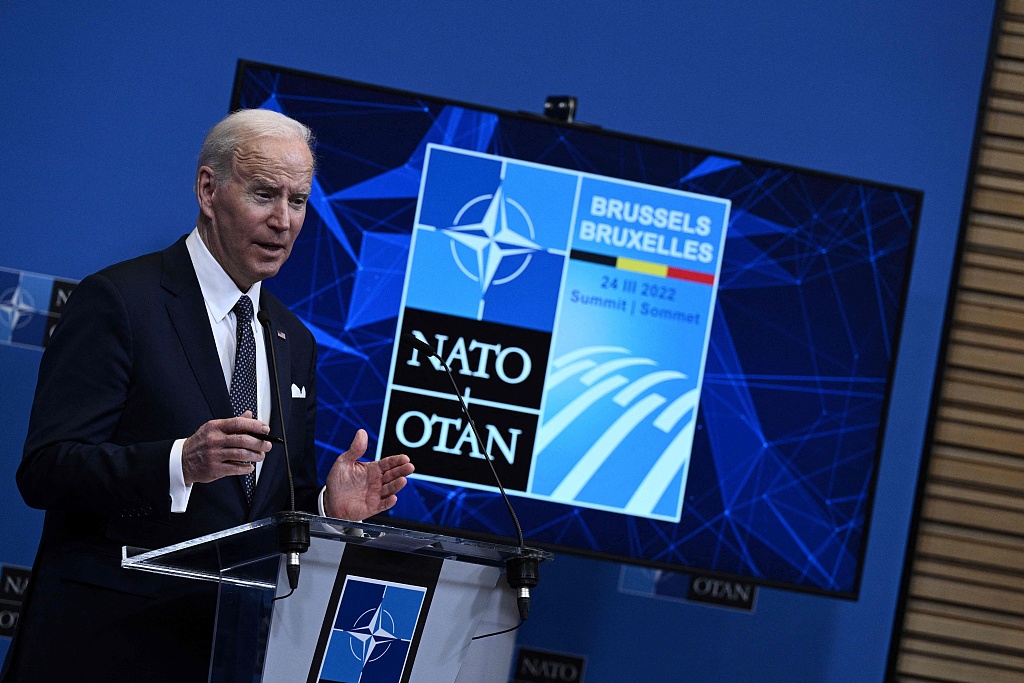
Editor's note: The Ukraine crisis has become the hottest topic in the international community, with lingering destruction inflicted on Ukraine and Russia. What are the driving forces behind the crisis? How will it develop? In the third article of this series, Jonathan Arnott, a former member of the European Parliament, shares his insights. The article reflects the author's opinions and not necessarily the views of CGTN.
The 19th century English philosopher Gilbert Chesterton once commented that: "The word 'good' has many meanings. For example, if a man were to shoot his grandmother at a range of five hundred yards, I should call him a good shot, but not necessarily a good man." In the same way, it is possible for foreign policy to be immoral but effective, or moral but ineffective. Irrespective of whether or not you agree with Western nations' views on Russia's military operations in Ukraine, it is still possible to distinguish a big difference in effectiveness.
The European Union shares a land border with Russia, spanning Poland, Lithuania, Finland, Estonia and Latvia. It is Poland in particular which has reportedly received over two million refugees from Ukraine over the last month. Ukraine has expressed a desire to join the EU. Economically, despite relative decline over recent years, taken collectively the EU27's GDP is still the world's third-largest economy behind the United States and China. The EU should, theoretically, be front and center of the global response to Russia's military operations in Ukraine. If the EU's foreign policy is ever to be influential in a global sense, the time should be now.
Yet the nations of the EU27 find it difficult to turn their shared sentiment into agreed policy. The EU is not always a confederation of like-minded states. The governments of Eastern European nations, once part of the Soviet Union, are often fearful of Russia and seek the strongest possible response.
Germany, by contrast, is reliant, perhaps over-reliant, on Russian gas. French President Emmanuel Macron seeks to remain in communication with Russian President Vladimir Putin. Competing interests abound, which makes the EU's voice quite transactional. It effectively negotiates its own position internally between its member states before presenting its decisions in public.
Meanwhile, the U.S. speaks with a much clearer voice – albeit in many ways a naïve one. The sheer size of the U.S. armed forces dwarfs those of the EU nations. It spent 3.7 percent of the world's largest GDP on defense in 2020, compared with an average of just 1.2 percent in the EU nations.
The U.S. also exerts considerable influence over the North Atlantic Treaty Organization nations. Given the substantial overlap between NATO and EU members, this American influence tends to dilute the importance of the EU's position.

U.S. President Joe Biden gestures as he addresses media representatives during a press conference at NATO Headquarters in Brussels, March 24, 2022. /VCG
U.S. President Joe Biden gestures as he addresses media representatives during a press conference at NATO Headquarters in Brussels, March 24, 2022. /VCG
Despite the geographical distances involved, the U.S. has taken (to put it mildly) an interventionist approach in wars in the past. Its recent military actions in Syria, Libya, Afghanistan and Iraq were misguided in my view. Ukraine may be on the EU's doorstep, but the U.S. exerts a greater influence militarily.
In some respects, China's foreign policy is the polar opposite of the U.S.. On Russia, as with many issues, it has steadfastly avoided intervening. There are two main differences: Firstly, China's Five Principles of Peaceful Coexistence demand paramount respect for other nations' sovereignty. Both positions are certainly clear.
Secondly, Western nations have generally made a value judgment: They believe that Russia is clearly morally wrong over the war in Ukraine. They perceive the Ukraine side to have been attacked unjustly.
My personal view is nuanced: Whilst I recognize that Western nations have provoked Russia, and that Ukraine is far from perfect, I also believe Russia's actions have caused unnecessary deaths and suffering. By contrast, as a matter of policy, China prefers to remain on cordial trading terms with everyone, and does not perceive its role as an arbiter of the rights and wrongs of the current conflict.
In truth, there is little difference between the views of the U.S., the EU, NATO and the United Kingdom on Ukraine. It is notable that Vladimir Putin's press secretary Dmitry Peskov recently described British Prime Minister Boris Johnson as "the most active participant in the race to be anti-Russian," reported by The Washington Times as "the Kremlin's number one enemy".
The UK's policy on Ukraine has been consistent: It has spent years training the Ukrainian military for conflict, and has sent substantial weaponry to Ukraine to aid its defense. Irrespective of the morality of the situation, Volodymyr Zelenskyy and Putin both seem to agree that the UK's efforts have been effective.
The EU's opinions of Russia and sanctions on the country reflect much of those of the Western world. What the EU lacks is a clear, unified view on how to formulate policy based upon those opinions.
Individual national leaders gain greater traction when they speak than the President of the European Commission. It leaves the EU back at the usual crossroads, the age-old question of sovereignty versus unity. They can, if they choose to, speak with a much stronger and clearer voice, but only at the expense of transferring more power from the member states to the EU.
Until that question is resolved, the European Union will continue to play second fiddle to the U.S. on foreign policy – even when the issue concerned is so close to home.
(If you want to contribute and have specific expertise, please contact us at opinions@cgtn.com. Follow @thouse_opinions on Twitter to discover the latest commentaries in the CGTN Opinion Section.)

